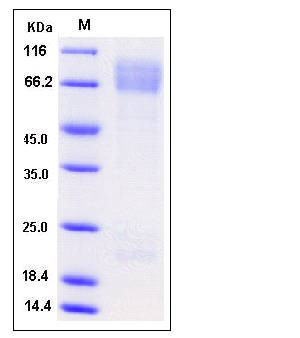Mouse ADAM15 / MDC15 Protein (His Tag)
MDC15,metargidin
- 100ug (NPP3172) Please inquiry
| Catalog Number | P51001-M08H |
|---|---|
| Organism Species | Mouse |
| Host | Human Cells |
| Synonyms | MDC15,metargidin |
| Molecular Weight | The secreted recombinant mouse ADAM15 (pro form) comprises 691 amino acids and has a calculated molecular mass of 74.6 kDa. As a result of glycosylation, the apparent molecular mass of the recombinant protein is approximately 80-90 kDa in SDS-PAGE under reducing conditions. |
| predicted N | Arg 18 & Asp 208 |
| SDS-PAGE |  |
| Purity | > 90 % as determined by SDS-PAGE |
| Protein Construction | A DNA sequence encoding the mouse ADAM15 (O88839-1) extracellular domain (Met 1-Thr 697) was expressed, with a C-terminal polyhistidine tag. |
| Bio-activity | 1. Measured by its ability to bind human PTK6 in a functional ELISA. 2. Measured by its ability to bind human SRC in a functional ELISA. 3. Measured by its ability to bind mouse SRC in a functional ELISA. 4. Measured by its ability to bind human LYN in a functional ELISA. |
| Research Area | Developmental Biology |Morphogenesis |Hedgehog Signaling Pathway |
| Formulation | Lyophilized from sterile PBS, pH 7.4 1. Normally 5 % - 8 % trehalose, mannitol and 0.01% Tween80 are added as protectants before lyophilization. Specific concentrations are included in the hardcopy of COA. |
| Background | ADAM15, also known as Metargidin, is a type I transmembrane glycoprotein belonging to the ADAM (A Disintegrin and Metalloprotease Domain) family of proteins and is widely expressed in different tissues and cell types. Members of this family contain an amino-terminal metalloprotease domain followed by a disintegrin domain, a cysteine-rich region and a membrane proximal EGF-like domain. The disintegrin domain of ADAM15/metargidin contains an RGD tripeptide sequence, suggesting that it may potentially interact with the integrin family of proteins. ADAM15 is a transmembrane multi-domain proteins implicated in proteolysis, cell-cell and cell-matrix interactions in various disease conditions. There is also evidence supporting a role for ADAM15 in angiogenesis and angioinvasion of tumor cells, which are critical for unrestrained tumor growth and metastatic spread. Given its diverse functions, ADAM15 may represent a pivotal regulatory component of tumor progression, an important target for therapeutic intervention, or emerge as a biomarker of disease progression. |
| Reference |
